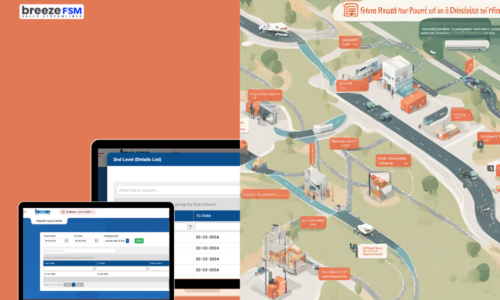- Breeze FSM
- Field Sales Management, Trends
- 0 Comments
- 1727 Views
Streamline, Optimize, and Succeed with BreezeFSM
- AI-powered Market Assistant
- Territory Mapping
- Activity Tracking
- Capturing and tracking leads
- Performance Insight
Field sales, once a traditional and face-to-face driven profession, is undergoing a rapid transformation. Technology is playing a crucial role in reshaping how field sales teams operate, interact with customers, and achieve their goals. In this blog post, we’ll explore some of the key technology trends that are shaping the future of field sales.
1. Mobile Sales Enablement
Mobile devices are fast becoming an essential tool for field sales representatives. With the right mobile applications, sales personnel can access customer information, product catalogs, sales presentations, and even CRM data while on the move. This, in turn, can enable them to be more productive, responsive, and better informed while interacting with customers.
2. Artificial Intelligence (AI) and Machine Learning
AI and machine learning are revolutionizing field sales by providing valuable insights and automating tasks. Predictive analytics will help in determining the prospects, forecasting sales, and optimization of sales territories. AI-powered chatbots will handle the routine inquiries of the customers and free the sales representatives to concentrate on complex deals.
3. Internet of Things (IoT)
IoT devices are narrowing the gap between the physical and digital worlds, opening up new avenues in field sales. Integration of IoT data with CRM systems will allow sales representatives to gain further insights into customers’ behavior and preferences. For example, sensors at retail stores can detect customer traffic and interaction with displays, helping sales reps tailor their pitches accordingly.
4. Augmented Reality (AR) and Virtual Reality (VR)
Augmented and virtual reality is now changing how the sales teams go about presenting field products and services. AR makes it easy to visualize products in real life, while VR can take customers through immersive experiences in understanding complex solutions. These technologies will improve customer engagement and allow better conversions of sales.
5. Social Selling
Social media sites have now evolved to include relationship-building and lead generation. The field sales representatives may use social selling to reach out to potential customers, share expertise in their industry, and establish themselves as thought leaders in the industry. Active engagement through social media by a sales representative will increase their visibility and credibility with a target audience that is active.
6. Gamification
Gamification can be a powerful way to ensure sales teams are motivated and increase their level of engagement. With game-like elements applied in the selling process, such as leaderboards, points, and badges, companies create an atmosphere of fun and competition that bolsters performance.
7. Virtual and Remote Selling
As the world shrinks further, the approach towards customers has to be increasingly virtual and remote in nature. Video conferencing, online demos, and digital signatures are enabling the sales teams to reach their customers from anywhere. This may reduce travel costs and help increase sales efficiency.
8. Predictive Analytics
Predictive analytics use data to make predictions about future trends and outcomes. It can find the high-potential customers for the field sales, predict sales performance, and optimize the territories of sale. From identifying proper sales opportunities to decision-making in sales strategy, leveraging data-driven insights can help a sales team perform better. Probably this reason makes Big Data so essential in any sales enablement strategy.
9. Sales Enablement Platforms
Sales enablement platforms bring all the sales content, tools, and training in one place. Such systems can keep the sales teams organized, find what they need in minimal time, and perform better overall.
10. Voice Assistants
Voice assistants like Siri, Google Assistant, and Alexa are finding their place in everyday living. Further into the future, one might schedule meetings, look up customer information, and even order products using voice assistants. This would ease the sales process and make things much easier for the customers.
Conclusion
The future of field sales is exciting and full of possibilities. With the adoption of such technology trends, sales teams would remain competitive, efficiency would increase manifold, and there would be tremendous value delivery to customers. As technology continues to evolve, it is vital for sales professionals to adapt and learn new skills to stay ahead of this curve.





